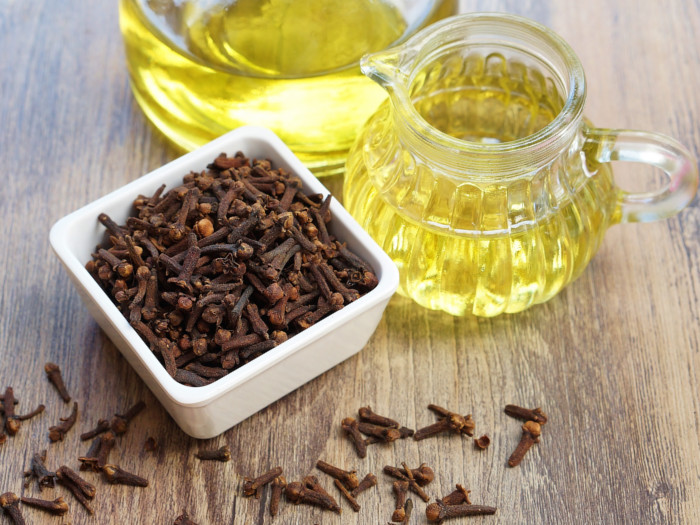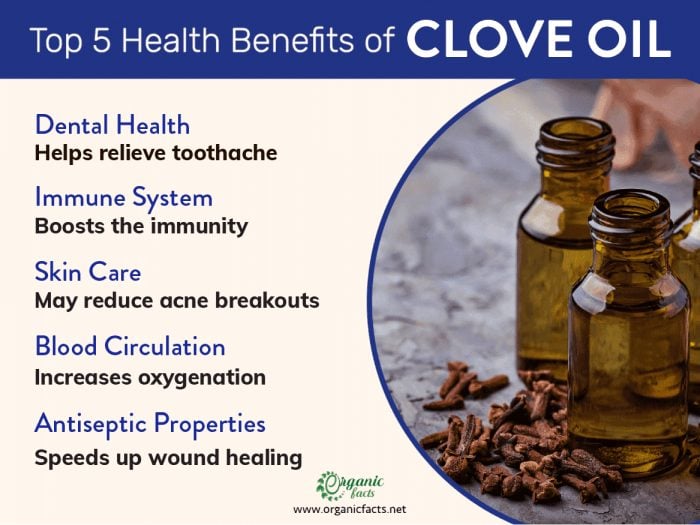The health benefits of clove oil may include relief from toothache, indigestion, cough, asthma, headache, and some symptoms of stress. The benefits can be attributed to its possible anaesthetic, antimicrobial, antifungal, antiseptic, antiviral, aphrodisiac, and stimulating properties. Perhaps, the most important and common use of this oil is in dental care. Various kinds of toothpaste, mouthwashes and oral care medications may often contain this oil as an important ingredient.
What is Clove Oil?
Clove oil is extracted from the dried flower buds of clove, scientifically known as Syzygium aromaticum or Eugenia caryophyllata. It has numerous possible medicinal properties and can be used topically for pain relief. The oil is rich in plant-derived phenylpropanoids, with the main compound possibly being eugenol. The other bioactive compounds may include thymol, carvacrol, and cinnamaldehyde. The color of this oil can range from pale yellow to golden brown. It has a spicy fragrance, similar to that of cloves. The oil can also be used as a fragrance and flavoring agent. [1]
Health Benefits
Although the oil is perhaps known primarily for dental care, the benefits are not limited to it. This powerful oil can do wonders for you. Let’s take a look at the multiple benefits that clove oil has to offer.
Potential Remedy for Acne
Acne is an issue common with teenagers but can plague anyone at any age. Essential oils are making their way into our skincare routines, and with their possible positive effects, it seems like they’re here to stay. You may have heard of rosehip, lavender, or lemongrass oil for skincare, but the goodness of this oil is often overlooked. While it has been known to have plausible antimicrobial properties, a study found it specifically effective against the strains of propionibacterium which can cause acne. [2] [3]
Eugenol in clove oil has probable rejuvenating and stimulating properties, which can increase blood flow to the skin and make it look radiant. You can consider making it a part of your nighttime skincare regimen, but beware that you may need to use it with a carrier oil. If your skin has reacted to oils in the past, it may be best to do a patch test first or seek professional consultation.

The most common and effective benefit of clove oil is toothache relief. Photo Credit: Shutterstock
May Help With Dental Care
Perhaps, one of the most popular and traditionally prevalent uses of this oil may be to obtain relief from toothache or pain in the gums. Eugenol, which is plausibly one of the most popular elements of cloves, can act as a natural anaesthetic when applied topically. While clove oil does not have any truly healing properties which can treat the root cause of your dental issues, it can work wonders as a potential natural palliative care option you can keep at home. Usually, it is best to dilute it with a carrier oil and use it on the problem area. Head over to ‘How To Use Clove Oil For Toothache‘ to know more about how to dilute and use it effectively. [4] [5]
May Provide Relief In Teething Pain
A study published in the British Dental Journal on teething trouble in infants recommends the use of clove oil as an ‘alternative holistic’ method. The potential medicinal properties of this oil can make it suitable for formulating a soothing balm for teething infants. It can be applied to a baby’s gums in an extremely diluted form. The potential antiseptic and soothing qualities of the oil can ease the pain and reduce discomfort. [6]

Clove oil is extracted from the dried flower buds of clove (Eugenia caryophyllata).
May Boost Sex Drive
Clove oil, or even cloves, is considered a potentially powerful aphrodisiac. Having 2-3 drops of the oil in warm water can help increase sex drive, boost blood circulation to sexual organs, and can perhaps act as an effective aphrodisiac. [7]
Potential Antimicrobial Properties
Due to its antimicrobial properties, clove oil can be used for preventing infections. It can be useful for wounds, cuts, scabies, athlete’s foot, fungal infections, bruises, prickly heat, and other types of injuries. It can also be used for treating insect bites and stings. The oil may be very strong and should thus perhaps be used in a diluted form. It should be carefully used by people with sensitive skin. [8]
Potential Antibacterial Properties
Clove oil may have strong antibacterial and antifungal properties and can inhibit the growth of moulds, yeasts, and bacteria. According to research, the phenolic compounds in the oil can kill several gram-negative and gram-positive bacteria. [9]
May Boost Immune System
Both cloves and their oil can be useful for boosting the immune system. Their potential antiviral properties can help fortify resistance to a multitude of diseases, plausibly because the antioxidants in clove essential oil scavenge the body of dangerous free radicals. [10]
Potentially Rich High Antioxidant Content
Eugenol in this oil is a powerful antioxidant with high free radical scavenging activity. It may have some antioxidants and ranks high in ORAC (Oxygen Radical Absorbance Capacity) value, which means that using it in small amounts or applying it to the skin can reduce oxidative stress and prevent chronic diseases. [11]
May Increase Blood Circulation
Eugenol is a versatile component that can also help stimulate blood circulation. Increased circulation can add to the oxygenation of the blood and organ systems, which increases metabolism. [12]
Can Prevent Ulcers
Clove oil, according to a research study, can help stimulate the synthesis of mucus, which is considered to be an important gastro-protective factor. This is why the oil and eugenol, their main compound, may help protect the digestive tract lining and can prevent the formation of ulcers and gastritis. It can improve overall digestive health and may help reduce nausea. [13]
Potent Anti-inflammatory Properties
The flavonoids in clove oil have potent anti-inflammatory properties. This powerful natural oil can perhaps be used to treat all kinds of inflammation in the body from toothaches, inflamed gums, skin eruptions, or muscle and joint pain, to inflammation in the gut. [14]
May Aid In Bettering Heart Health
Clove oil can boost heart health in many ways. Research published in the British Journal of Pharmacology showed that eugenol in clove oil helped dilate arteries while reducing systemic blood pressure. Another bioactive compound in the oil, acetyl eugenol, is a potent platelet inhibitor. It can prevent the formation of a thrombus or a blood clot. [15]
Note: Clove may be a natural blood-thinner and must not be used along with other blood-thinning medications.
Can Provide Pain Relief
Clove oil can be used as a pain reliever. A few drops of the oil, when applied to joints and overworked muscles, may provide relief from soreness and swelling. Ensure that you dilute the oil before topical application, and do a patch test if you have sensitive skin.
May Help in Controlling Diabetes
Clove oil has been studied for its potential to aid in diabetes management. An animal study published in the International Journal of Pharmacology studied the effects of clove as well as ginger oils on diabetic rats. It noted that these oils are antioxidant agents and could help manage diabetes and the symptoms that arise from the same. [16]
Potential Hepatoprotective Properties
Research studies show that bioactive compounds in clove oil can help promote liver health. They can help prevent fatty liver disease and reverse signs of liver cirrhosis. [17]
Other Uses of Clove Oil
- Insect Repellent: It is used as a component in bug repellent and insect-repelling candles because the vapour can be very potent against insects. Traditionally, a few drops of the oil are put on the bedsheets at night to keep bugs away. [18]
- Cosmetics: It is can be used as a massage oil. Due to its powerful aroma, soothing effect, and plausible antiseptic properties, clove oil is often added as an active ingredient in soaps and perfumes.
- Clove cigarettes: Traditionally, clove was added to cigarettes in Indonesia. However, it is just as harmful as regular cigarettes, if not more. [19]
- Aromatherapy: Clove oil can blend well with many essential oils which may include basil, rosemary, rose, cinnamon, grapefruit, lemon, nutmeg, peppermint, orange, lavender, and geranium. This could be the reason why clove oil is a popular element in aromatherapy and perhaps also in other herbal combinations.
Side Effects
Clove oil can have a strong burning sensation if used in large quantities. It is always advisable to use small amounts of essential oil and to be careful when using it on children if you have never used it before. The side effects of clove oil include:
- Allergy & toxic effects: An excess dose may cause allergic reactions or toxic effects due to its eugenol content.
- Intestinal problems: It can cause intestinal discomfort, primarily in children.
- Low blood sugar levels: This oil can cause blood sugar to drop. So people with diabetes should be cautious.
- Bleeding disorders: People with bleeding disorders such as hemophilia or those taking blood-thinning medications should avoid this oil.
Pregnant women and those who are nursing should not use clove oil, as it is not clear whether this strong compound passes to the infant in breast milk. Also, patients should stop taking the oil before a surgery or a dental procedure as it can increase the risk of bleeding.
As with any change of diet or nutritional supplement, it is best to consult a doctor before administering or adding it to your daily or weekly regimen.
What is Eugenic Oil?
Eugenic oil is a pale, yellow, or colorless liquid that can be chemically separated from original oil. It can also be found in the essential oil of bay leaf and cinnamon. Also known as eugenol, it is often used as a potentially antiseptic and anaesthetic substance. However, due to its high concentration, it can be harmful to the liver if not diluted with a carrier oil or when consumed in large quantities.
